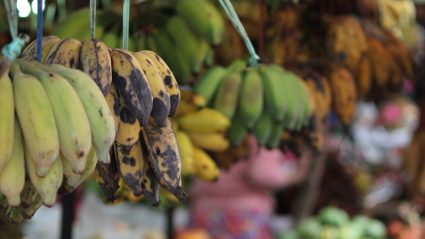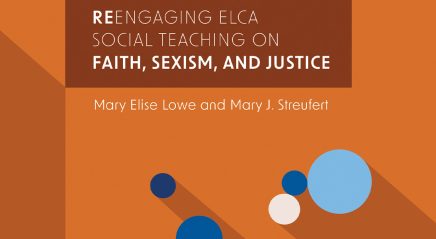Series editor’s note: In 2025, “Deeper understandings” is focusing on the ELCA social statements. We hope to reintroduce them to readers as a means of provoking fruitful, enriching conversation between Christians with different understandings and convictions, and as a springboard for active discipleship in the world. Each article will introduce a particular statement and its Lutheran theological underpinnings, then suggest ways in which it can spark faithful conversation and action in the service of your baptismal vocation.
My hope is that you will find this series relevant to your current context and that it will help you express your Lutheran faith in your daily interaction with family, friends, neighbors and co-workers—for the sake of the flourishing of the gospel of Jesus Christ in the world and the life abundant of the neighbor and stranger.
—Kristin Johnston Largen, president of Wartburg Theological Seminary, Dubuque, Iowa, on behalf of the ELCA’s seminaries
Across the political spectrum today, many feel a sense of alienation, confused and uncertain about everything from their future job prospects in the age of artificial intelligence to something even deeper—namely, the future of their respective ways of life. Though identity politics often pits people against each other in what feels like a winner-take-all battle among racial, cultural and partisan groups for status and power, there’s a desperate need for spaces where people can truly belong without losing who they are. In this fraught time, the church has the opportunity—and calling—to model something profoundly different.
Growing up as a first-generation Asian American kid in the United States, I often heard the United States touted as a “melting pot.” However, I rarely felt as if I could simply blend in. You could fawn your way into white circles, which was expected, but such an approach wasn’t without its psychological costs. Though European ethnic groups seemed to integrate into mainstream America effortlessly, others faced a starker choice: assimilate to the dominant culture or remain on the margins. This assimilation demands that people shed their cultural identities, languages, traditions and ways of being in the world to gain acceptance.
This isn’t just idealistic thinking; it is rooted in a core theological truth.
In 1993, the ELCA set out a different vision in its social statement “Freed in Christ: Race, Ethnicity, and Culture.” In it, Christ is cast as one who “breaks down walls of cultural exclusivity” and beckons the church to do the same. In other words, our call from Christ is to create a community of genuine belonging without demanding assimilation from anyone. This isn’t just idealistic thinking; it is rooted in a core theological truth. Scripture tells us of one humanity created by God in wondrous diversity. Though we have weaponized our differences, Christ has reconciled us with God and one another and calls us to live out that reconciliation. Sharing one Lord, faith and baptism is a unity that doesn’t dissolve, deny or disallow our dissimilarities.
The social statement considers this weaponization of our differences in its definition of racism as “a mix of power, privilege, and prejudice.” This combination puts in place barriers that deny the fundamental truth that all people are created by God and therefore possess inherent dignity. In her work, legal scholar Frances Ansley elaborated on this view by describing white supremacy as a comprehensive system in which white people control power and resources, ideas of white superiority pervade society, and patterns of dominance and subordination play out daily across institutions.
An extraordinary opportunity
In our current moment, as backlash against diversity, equity and inclusion intensifies and associated personnel and programs are cut, the church has an extraordinary opportunity. Rather than retreat into quietude or choose sides in the culture wars, the church can become a living demonstration of what is possible when it chooses belonging over assimilation, thereby becoming a powerful witness to the broader society. When neighborhoods, communities, organizations and corporations see churches gathering people across racial, ethnic and cultural lines—not by denying real differences but by celebrating them—they glimpse what is possible in their own contexts.
But can faith in Christ really hold such radically diverse people together, or is this just wishful thinking? The answer, I believe, lies in what Martin Luther called “the theology of the cross.” This theology is not about suffering for its own sake; rather it suggests that God is particularly present with those who suffer and are marginalized. This divine presence calls everyone into solidarity with those who have been left behind by dominant systems. This is the inspiration that continues to make Christianity relevant to the world; without this gospel proclamation, it has lost its way.
When churches get this right, they become signs of hope in a divided world.
When the church embraces Christ’s calling to embody radical diversity, something beautiful emerges. A new culture forms—not one that replaces existing cultures but one that creates space for all cultures to breathe and make the best of themselves. This new culture of welcome doesn’t require people to check their identities at the door. It’s a culture of healing that acknowledges past and present wounds while working toward restoration. It’s a culture of peace that doesn’t ignore conflict but transforms it through love.
To be clear, this vision isn’t naive about the challenges at hand. Creating truly inclusive communities requires hard work; honest conversations about power, privilege and prejudice; and an ongoing commitment to, and effective action toward, justice.
When churches get this right, they become signs of hope in a divided world. They prove that unity doesn’t require uniformity, that strength comes from diversity and that belonging is more powerful than assimilation. They demonstrate that God is expansive enough to hold us all—in all our complex diversity. In a time when our society seems determined to tear itself apart along racial, ethnic and cultural lines, the church that chooses belonging over assimilation offers something the world now needs: a glimpse of a new culture where everyone finds a home.
Get this column in your inbox: Visit livinglutheran.org/subscribe and sign up for the free email digest “LL Stories.” Receive the digest weekly, biweekly or monthly, and select the categories that interest you. (“Deeper understandings” is a “Voices of faith” column.)









